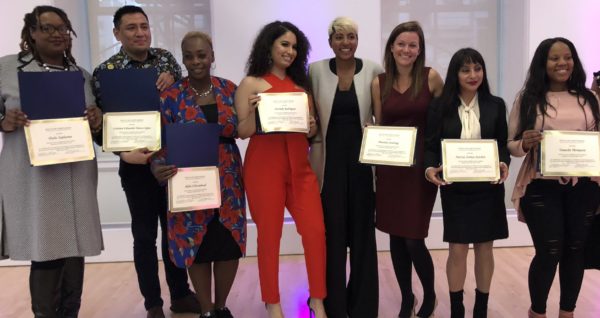Renata is a Survivor Leadership Institute graduate from the Class of 2019. Our Survivor Leaders are former clients of Sanctuary, who go through a 12-week training and certification course to prepare them to make system-wide change through advocacy, training, program development, and working directly with other survivors. The training course includes public speaking, vicarious trauma, self-care, media re-exploitation, advocacy, and boundary setting.
The Survivor Leadership program has a rigorous application and interview process, as the content of the training program is very challenging and can be triggering. Each of the graduates has participated in counseling in the past, and during the program they rely on their skills, their strength, their robust support systems and one another in our Survivor Leadership community. They have done the work to make it this far, and we are honored to have them become Sanctuary Survivor Leaders.
—
We often think of graduation as a milestone marking an entrance to a higher standing and the receipt of a diploma. To graduate also means to move from one stage of experience and prestige to a higher one, such as leadership. On May 13, 2019, the new cohort of survivor leaders at Sanctuary for Families did just that. I’m proud to say I am a part of this tribe, a part of the new cohort and a part of the story that extends before my time and to individuals who remain hidden and still in trouble.
As each of us stood at the podium to speak our truth, we celebrated life. Life after pain. Life after heartbreak. Life after trauma. We joined a brave tribe of survivor leaders fighting for justice, lifting shame, eradicating stigma, and promoting healing—all of whom are doing so with courage and strength that this work requires. Most of us didn’t choose our experiences. We didn’t choose our hurt. We didn’t choose disappointment and struggle. Now we certainly don’t choose what happened in our lives to define us. We choose to stand up, speak up, break the cycle, fight the system, educate the world, and be there for each other along the way. Today we choose to do something. Standing on the shoulders of those who came before us, today we are ready to support others on our shoulders. Our past drives us. Our future excites us. Our present allows us to show up—for ourselves, each other, and hopefully, many others.
For me, and I suppose for many others, healing is a process with ups and downs. It involves empathy and forgiveness—especially for myself. Healing also involves love for myself and others. My fellow survivor leaders and I are here today because the deeply broken people who tried to break us didn’t succeed. Unfortunately for many others, this is not the case. I hope that one day we will focus on the troubled situations that give rise to people who think it’s their right to take the lives of others, in one way or another, but we still have a long way to go. It’s an honor and privilege to stand among individuals paving the way for the justice that many of us never received and as a reminder that this can happen to anyone, and if it’s happening to you, you are not alone. We need to close the chapter on the narrative of broken, fragile, and gullible victims. No one standing at the podium at the Survivor Leadership Institute Graduation embodies any of these qualities. Instead, it was a night celebrating courage, determination, strength, vulnerability, resilience, and hope, along with intelligence, beauty, inspiration, and humor.
I recognize that I get to tell my story because I am lucky, and I survived. But becoming a leader isn’t luck—for me, it’s about being grateful for my life with all its twists and turns, the support of my fellow leaders, and Sanctuary for Families. This leadership opportunity is so much bigger than my story. The truth is that to get where I am today, I had to experience my yesterday. I stand with my humanity intact, and I no longer bear the weight of the lack of it in others.
Graduation night was a testament to the fact that our tribe is getting bigger. Our collective voice is getting louder. As Oprah says, our voices are our power. By breaking our silence and sharing our stories, we are taking our power back. Power we didn’t give away. Power that was taken from us by people we loved and trusted. This is an important distinction I hope others come to accept and recognize as we move away from painting inaccurate caricatures of victims and begin to focus on the individuals, ideologies and systems perpetuating gender-based (and related forms of) violence.
